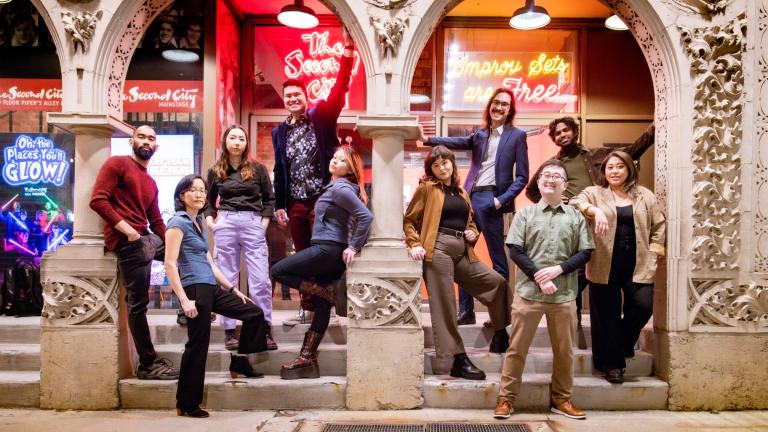
 Comedian Hannah Gadsby on Fame, Barbra Streisand and Performing in Chica.
Comedian Hannah Gadsby on Fame, Barbra Streisand and Performing in Chica.
Hannah Gadsby has gone through a seven-year life cycle, as they describe it, since their comedy special “Nanette” shot them into an international spotlight
Now, they’re touring the U.S. with their latest standup show “Woof!” which has a feeling similar to the title — a bit anxiety-inducing. In it, they take on ideas around fame, resistance and parasocial relationships.
The Australian comedian is known for being open about their life — from talking about growing up as a lesbian in a place where homosexuality was illegal until 1997 to navigating relationships as an autistic person.
Gadsby wants their audience to “have a think” at the show and, in turn, also have a laugh as they point out some universal truths.
Gadsby sat down with WTTW News ahead of Thursday night’s show at the Chicago Theatre.Hannah Gadsby: Part of what I bring to the stage in that vulnerability is that I just have to acknowledge what’s happening. We all know what’s happening here — I’m just one little guy and there’s a lot of you, and that doesn’t make me afraid in the moment, like, I’m not scared of public speaking in the traditional sense, but also the numbers game is daunting. It’s weird for me that I’ve built a career where it’s officially my job to start a conversation. I walk out on stage and everyone’s like, ‘You first,’ you know? And that is not how I live life. (laughs)
With this show in particular, I am sort of struggling with — what conversation am I trying to have? I think I’m in a weird place now, in a post-success world where my vulnerabilities have changed. It is a genuine vulnerability to be afraid to fail, and that fear of failure, once you have this elevated success that I stumbled into, it changes your voice because when you don’t have anything, you don’t have anything to lose. But once you’ve built a name and you have expectations, you have a lot to lose.
I want to wipe that away again. … I feel like this show is again going: My life’s changed, the world has changed. My voice and what I’m saying and how I say it is necessarily going to change because the landscape is different, but it’s incredibly difficult to change as a public figure, and that’s a large part of what this show is.
When you started doing what you do, did you anticipate this level of fame? Is it something that you strived for?
Gadsby: No. My main motivating force has never been ambition, it’s been moving away from discomfort. For me as an autistic person, discomfort reads differently. For a lot of people, being different is extreme discomfort. For me, doing something I don’t understand is extreme discomfort and that’s where I am now, which is really existential discomfort because I have a life now that is very different. I’ve moved out of an economic bracket that was a hustle and a struggle. The question I had to ask every day was: How? How am I going to do this? How am I going to make ends meet? How am I going to sell tickets? How, how, how, how.
And now it’s become why, which is a position of extreme privilege and one that I’m grappling with in this show.
Has fame changed who you are as a person?
Gadsby: I guess so because, I think it just puts weird emphasis on parts of your life that didn’t even exist before. It’s just a different view, like, you’re up here now. So to connect to others, you look down, which is a weird concept isn’t it? It’s metaphorical, like, I’m quite tall, but I try not to look down on people.
Because it (fame) happened so late in life, sometimes I worry like, ‘Is this really self indulgent?’ It’s so hyper specific. My life just keeps getting more aggressively idiosyncratic, and I’m in the business of real talk, you know? But my life isn’t real anymore.
But because it happened so late in life, I’m not searching for who I am. I’m 46, and I feel like I’m now in a position and a maturity to help younger people find their way in the world. But I don’t understand the world. It’s changed so much in the last seven years. Even if you look in my industry, the way that young comics have to get their work out in the world is so different to how I had to do it, so, like, I feel like a grandfather before my time.
In the show you make a few references to Barbra Streisand. Why Barbra Streisand?
Gadsby: Well, the show began as an exercise in parasocial relationships. I just listened to her audiobook, and I thought that as a piece of work it was one of the most remarkable things I’ve experienced because she’s definitely a person that is focused on what she’s focused on — whether it be Marlon Brando or potato, you know? I just really felt, like, this intimacy that sort of works as this rich underpinning for this incredible oeuvre that has spanned an incredible time in the world, like, the last half of the 20th century. In the sense of history, it’s this huge change moment and we are living in a world that is so dramatically different from when she began her career. I just find that as a resource of history to be really interesting, and she’s such a unique voice. She’s lived this unreal life of fame to the point, like, her life of fame is a bag of sugar and mine is a grain.People have a parasocial relationship with me, which I find really difficult because I don’t understand relationships. I’m manually thinking my way through it, and (fans) don’t know me but I build intimacy with my work. So, I thought about flipping the script on that parasocial thing. What if I have a parasocial relationship with Barbra Streisand? And I wanted to flip the script on the concept of a one-woman show, which is often how my work is denigrated for whatever reason. But I wanted to create a one-woman show and the one woman was Barbra Streisand, and build to — maybe I do a show and she’s in the audience, you know? That was the pipe dream.
I still sometimes think in conversation with Barbra Streisand. Parasocial relationships are very confusing, but I think there’s one element that is kind of healthy — not for the famous person — I think it’s mostly weird and unhealthy, but you’re investing in a life and an imaginative process that’s outside of yourself. I think anything that encourages you to think beyond the existence of your skin is an interesting process.Gadsby: That’s the struggle of my work, and it’s particularly inherent in this show. The whole show is grappling with that manual thinking, but I think the world is in this phase where we’re hyperaware and everyone is in a place asking: ‘What is happening and how do I fit in?’ There’s a general sense of unease at the same time when so many people are so confident in their opinions, and I think this work is defined by my lack of confidence at a moment in my life when I should have the most confidence.Gadsby: It is a vastly different world out there for new comedians. If anything, they’re going to be the ones who I will learn off. They’re so reliant on the audiences they build themselves, but those audiences don’t necessarily go out to see comedy, and attention is so much different now. My advice would be to resist what seems to work now because the landscape is so changeable and people’s attention is hopping all over the place and the algorithms pretend they can predict what people want, but really what they’re doing is making everything boring. It depends what you want out of your career. If you want to be interesting, see what works and try something else. Find your voice first, but how you do that I wouldn’t know.Gadsby: I’m only just starting to unravel what happened to me. In its own way, success was a traumatic experience — not in the sense that it’s all negative, but it is in the case that it’s difficult to comprehend or prepare for or understand. I don’t think we’re psychologically equipped to understand that we’re being perceived by as many people as we are. It’s an insanity.
You can’t comprehend this amount of people and yet you’re talking intimately to them. There’s an element of faith in that, you know, sending your little signals out and the faith that they’ll land in the right harbors even, as you know, that it’ll land on hostile shores at the same time.
So the thing about success is — in all that trauma, you then will have the means to insulate yourself and protect yourself in a way. But it’s all new, and I guess what we’re learning here is I shouldn’t go back to talk to my former self because I probably wouldn’t do anything. I’d go, ‘That sounds like too much.’ I think it’s best if I don’t imagine what’s going to happen because not doing anything is my superpower.
Leave a Reply